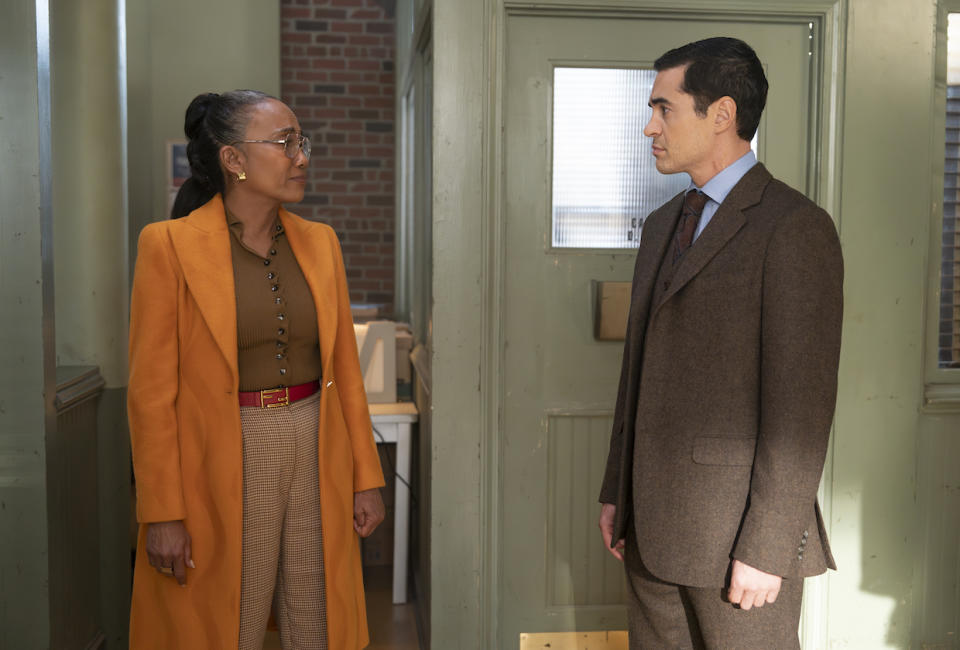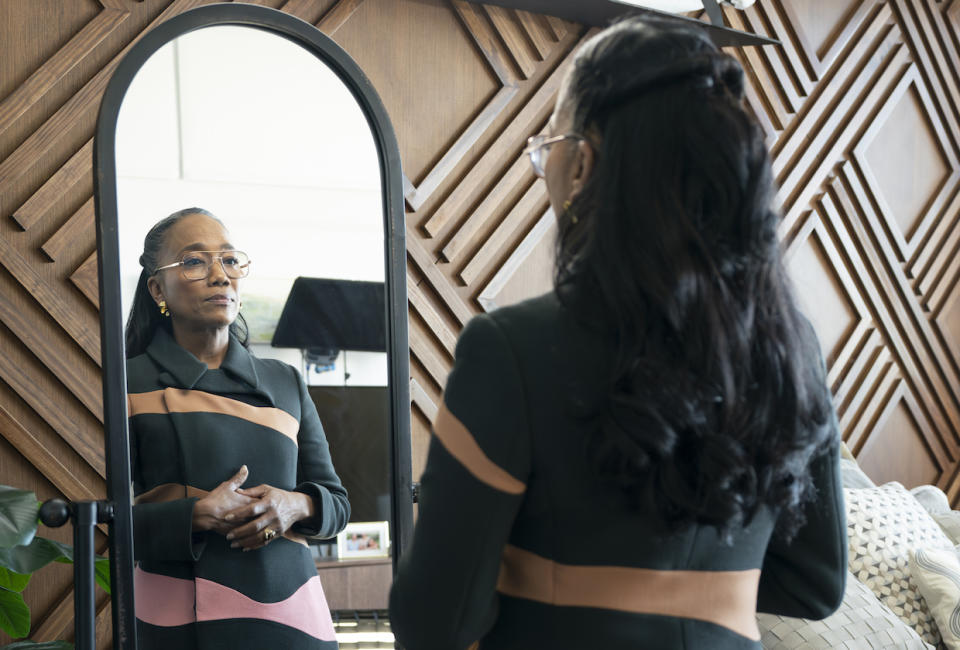Will Trent’s Sonja Sohn on Amanda’s ‘Crisis of Conscience’ and the Trauma That Altered Her Character’s Journey
Will Trent on Tuesday saw GBI deputy director Amanda Wagner (played by Sonja Sohn) forced to confront painful moments from her past.
Season 2’s fifth episode — “Capt. Duke Wagner’s Daughter” — revealed that Amanda was nearly raped at a traffic stop in 1995. Serial rapist Chuck Murray was let off scot-free when one of his victims was too afraid to testify, so Amanda planted 28 grams of cocaine on her attacker — the exact limit to escalate a drug possession to intent to sell — and he spent the next 30 years behind bars. Upon his release, Murray tried to even the score and frame Amanda for the murder of a GBI janitor, but was shot and killed by Agent Trent once he went after her.
More from TVLine
<em>Good Doctor</em> Kills Off [Spoiler] in Final Season Twist
9-1-1's Oliver Stark Blasts Critics of Buck's Bisexuality: 'I Fear You've Missed the Entire Point'
Before Murray attacked Amanda, she was on her way to GBI headquarters to admit that she planted evidence. But once the investigation was closed, and Amanda was reinstated, she decided to keep her crime a secret from her superiors — and no one was more disappointed in her than Faith.
Below, Sohn weighs in on the Wagner-centric installment….

TVLINE | This marks the first time we see Amanda deal with a crisis of conscience. Did learning what the audience knows now — that Amanda planted evidence on Chuck Murray all those years ago — change your perception of this character?
That’s a great question. It did, but maybe in some other ways. I will say that, to discover that Amanda had had her own crisis of conscience — that she had been physically and sexually abused on the job, and she had to make that decision — that brought a new understanding to the character for me. That opened up into understanding her pain and her grief. All of a sudden, there was more information as to why Amanda does not have a partner, why Amanda is tough on the job, and why she’s channeled certain aspects of herself into the job.
TVLINE | Amanda is a stoic character. She rarely lets herself be vulnerable in front of others. When she does — take, for instance, when she and Will stood side by side at the vending machines at the end of Season 1 — she tends to say very little. But that wasn’t the case here. Not only did she tell Will that she was nearly raped, but she confessed to him a crime she’s kept secret for 30 years. What do you think it is that allowed her to open up here in a way that we haven’t seen her open up before?
She’s forced to in this instance. She gives it up willingly, but it’s the circumstances that put her there. In those scenes with Will, Amanda doesn’t know how to be intimate in that way, so you’re seeing her struggle with intimacy. There are a lot of personal layers there between Amanda and Will, and a lot of personal territory that Amanda has to cover. In this instance, Amanda has been holding back all of this time. I think being forced into this circumstance actually allows her to have the voice and the words that she needs to have, and the history and the context that Will needs.
I wrote something on Instagram today about playing the boss in these shows. There’s only so much space, so much real estate for that character in every episode. So, as an actor playing that role, a lot of the life of the character that I have to live — to truly give you a real, dimensional character in the moment — is all lived off screen. So when you asked me that question, yeah, there were plenty of words I wanted to say, that I wish the character could have said in that moment [in the Season 1 finale, when Will found out that Amanda intended to adopt him]. But my work as an actor is: How do I keep all of that internal and unspoken? And then there’s the story that has to be created for that character who won’t speak it in that moment. And for me, that’s an exploration.

TVLINE | So, when it came to the Chuck Murray case, and what took her so long to communicate what happened to Will…
She doesn’t know how to communicate. This is not simply that she’s been sitting on it, you know? There’s the facts of the case, but those are not the emotional underpinnings as to why this character cannot communicate what she needs to communicate in that moment.
She’s been sitting on that powder keg. This was a traumatic incident in her life. The mental health awareness that we have now was not available to her at the time. She had to bear [her trauma] if she wanted to move forward. She was part of the same generation that I’m a part of. You’re here to knock down walls. Amanda needed to learn how to get through tough stuff in order to be the first woman [in her position] among a bunch of patriarchal men. You had to be a certain way to [eventually] be the boss….
I do believe, for me, that Amanda went and got some sort of therapy, but psychotherapy was not where it is now. They were labeling certain issues, and certain traumas, as one thing when they were another, and the woman gets shortchanged in that, and not truly served. What Amanda has had to do is become tough. She built that shell. But there’s a heart there, and we get to see it as she evolves through scenes like this — and I get to discover it, too.
TVLINE | You mentioned that Amanda is tough, and I think that’s a good word to describe her. But there was a moment in Episode 5 where she wasn’t so tough, and it’s a moment that stuck with me — the moment where we saw her pinned to the ground by S.W.A.T. She looked petrified. That’s not necessarily an emotion we’ve seen on Amanda before….
In that moment, she’s angry, right? She’s enraged. But what’s underneath that? What Amanda fears the most is to be powerless. In that scene, she’s rendered completely powerless, and it takes a whole squad. She’s not going down when it’s one cop, right? S.W.A.T. has to come in with automatic weapons! Underneath that, what has to show is the deepest fear of the character, which isn’t something you play [in the moment]. You play it by virtue of the work that you did prior, and then you hope it shows. She is powerless, and she is rendered completely helpless in front of Will who, for all intents and purposes, is her son.
TVLINE | Faith expressed disappointment in Amanda after Amanda decided not to come clean and tell her superiors about planting evidence on Chuck Murray. How does that disappointment weigh on Amanda moving forward?
It’s like when your kid realizes that you’re human, you know? When they see you in a light that is not favorable. It’s basically when children lose their innocence with regard to their parents. What I discovered in that moment was that Faith could one day be Amanda — a successor in training.
As a parent, when that happens — when you see your child catch you and call you out — you gain respect for your child. If you’re a good parent, that’s when you start realizing that your child is evolving. This can be a reciprocal relationship now. Now you’ll start getting some ROI — some return on investment — and that’s what Amanda sees. It’s Faith coming along now. One day, Faith could have my job.
And I’ll be honest with you: The jury’s still out on Amanda in my own head. I’m pretty tough on cops. Sonja Sohn is pretty tough on law enforcement. I get it — women have to find their own justice in the desert — but I’m split here. She’s a badass, and sometimes you’ve got to spin that law in your direction, and then the other part of me says, “If we go by the rules, is Amanda the bad cop?”
TVLINE | It’s a morally grey area, for sure.
That’s what I’m saying! Exactly! Those are good words for that. I’m not taking it too seriously. It’s something fun to play with.
What did you think of Will Trent Season 2, Episode 5: “Capt. Duke Wagner’s Daughter”? Read Sonja Sohn’s aforementioned Instagram post below, then hit the comments with your reactions to the hour.
Best of TVLine
Get more from TVLine.com: Follow us on Twitter, Facebook, Newsletter

 Yahoo Movies
Yahoo Movies 
